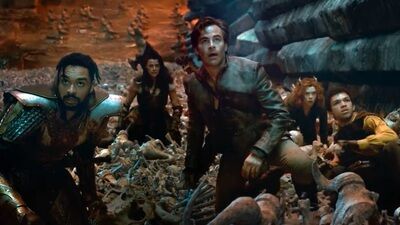Michelle Rodriguez delivers plenty of stone-faced one-liners as the aptly named barbarian Holga Kilgore, and Regé-Jean Page is an undeniable scene stealer as the gallant, devastatingly heroic paladin Xenk, a character who perfectly encapsulates the kind of one-off character players might encounter when they need a hand dealing with a particularly difficult encounter.
Though part of the beauty of Dungeons & Dragons is the near-endless options players have when it comes to character building, there are still classic archetypes that “Honor Among Thieves” understands and utilizes to make its characters feel truer to the setting. Doric is a Tiefling and therefore scared of humans, devout paladin Xenk can quite literally smell evil, and Edgin can always be relied upon to inspire his allies with his bardic talents.
In addition to channeling the spirit of the game, “Honor Among Thieves” also excels when it comes to visualizing game mechanics and translating them to the modern big-budget action formula. Edgin has the classic “dead wife” fantasy backstory, but the film also blends this trope with elements from D&D—not only did he lose his wife, but he left the Harpers, a network of do-gooders who frequently pop up in D&D campaigns.
Edgin’s fall from grace and exile from the Harpers is made all the more interesting when considering how the film employs the classic mechanic of Dungeons & Dragons to fit its storytelling purposes. During flashback sequences, he makes several references to his Harper “oath”—oaths being sacred pacts that are held by a class of heroes called paladins. In D&D, if a player’s paladin breaks their oath, they’re forsaken by their peers and lose all access to their previous magical abilities—a piece of worldbuilding that adds a layer to Edgin’s tragic backstory.
For Edgin to be not just a bard, but also have complicated in-world history as a paladin who broke his oath not only gives the character depth beyond the conventional goofy, freewheeling jester or troubadour type but also speaks to Goldstein and Daley’s knowledge of and appreciation for D&D as a game.
The use of game mechanics to further character isn’t just limited to Edgin, either. Justice Smith’s Simon is a wild magic sorcerer (a class whose power will randomly fluctuate and yield unpredictable results), and his entire character arc is hinged around his inability to control the powerful magic he inherited from his bloodline. Just as wild magic can turn the tide in a game of D&D in real life, Simon’s wild magic surges come in clutch for the party at crucial moments as an ability that Simon eventually learns to wield to his advantage.

